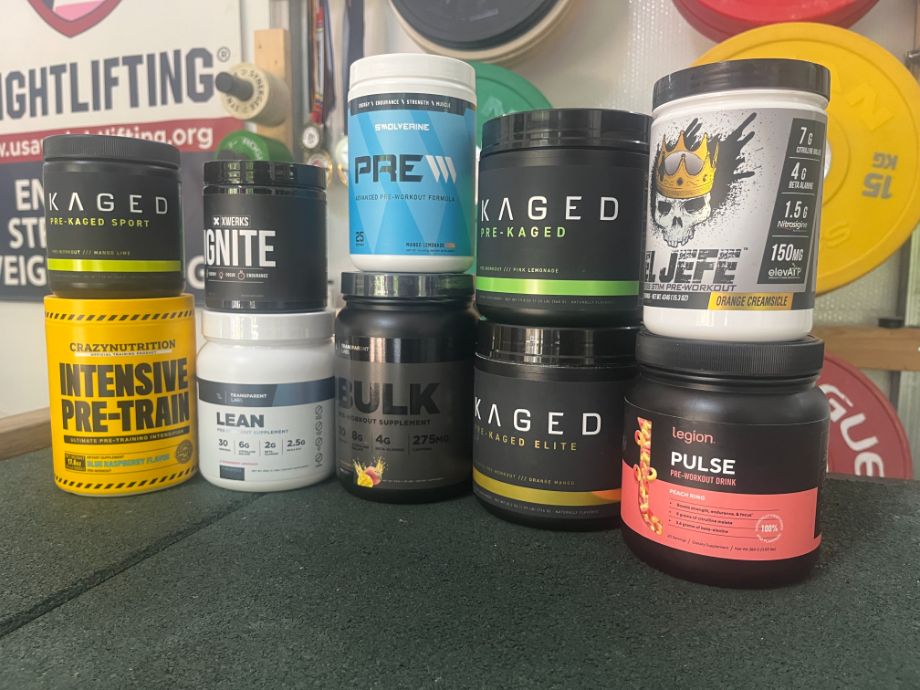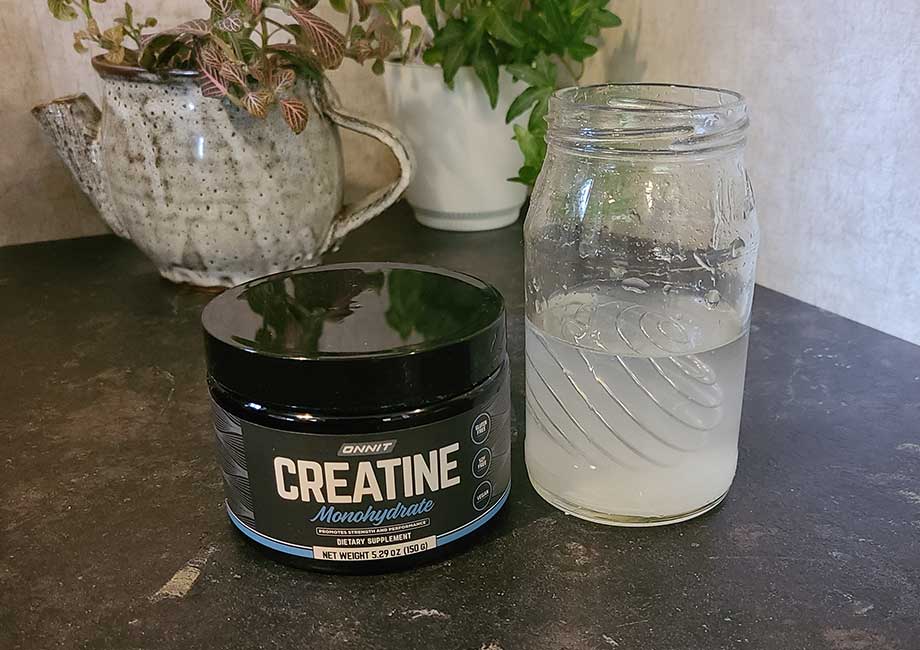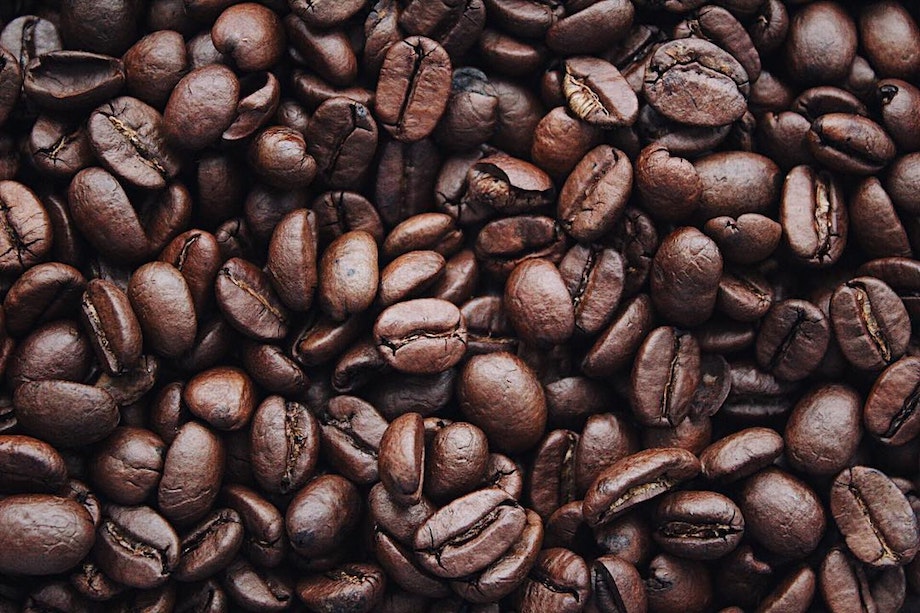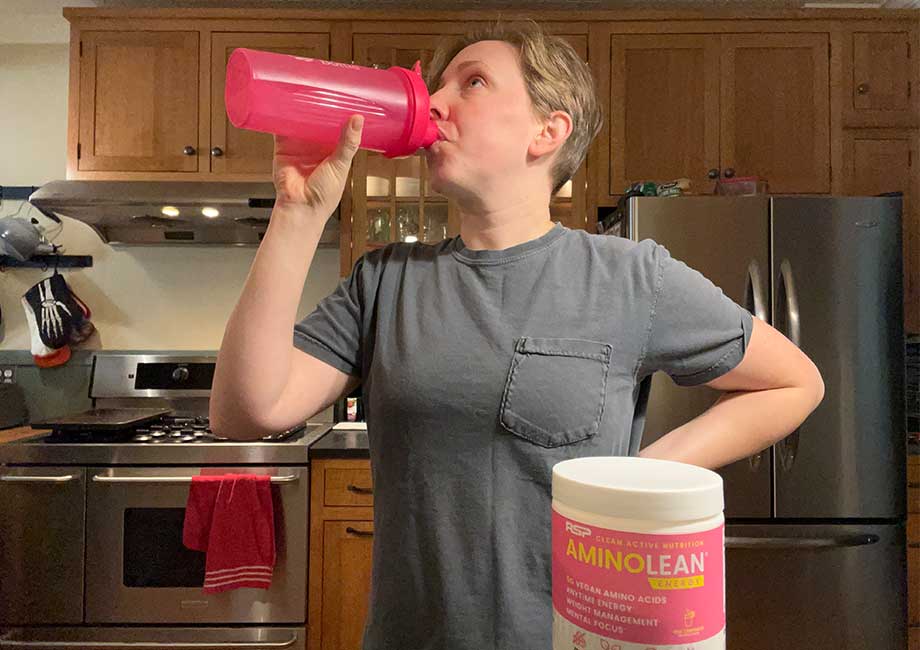We test and review fitness products based on an independent, multi-point methodology. If you use our links to purchase something, we may earn a commission. Read our disclosures.
Countless fit folks practice working out while intermittent fasting to slim down, build muscle, and perform better. I’m not necessarily saying fasting is indisputably effective at providing those benefits, but some people swear by the practice. It requires tremendous willpower, planning, and effort. So, wouldn’t it be a nightmare to discover that your pre-workout is stealthily breaking you out of that fast, thus robbing you of any potential benefits for that much-needed energy boost?
But does pre-workout break a fast? In this article, I—a sports dietitian—am here to answer the question, “Does pre-workout break a fast?” by explaining what fasting is, how it works, and whether pre-workout supplements and their ingredients are helpful or detrimental to your fasting regimen.
Let’s dive in.
Medical disclaimer: This article is intended for educational and informational purposes only. It is not intended as a substitute for medical advice. For health advice, contact a licensed healthcare provider.
Short Answer: Does Pre-Workout Break A Fast?
For the most part, most pre-workout ingredients don’t contain enough calories or macronutrients to raise your blood sugar enough to break a fast. However, there are always exceptions to the rule. For example, a pre-workout containing carbohydrates like sugar or maltodextrin can raise your insulin levels enough to knock you out of a fasted state.
Studies have shown that branched chain amino acids (BCAAs) help promote an insulin response as well1. So, if you’re fasting, it’s best to choose a pre-workout that’s calorie-free and doesn’t have BCAAs.
What is Pre-Workout?
Pre-workout supplements typically come in a powder form, which people take before high-intensity exercise. They contain ingredients intended to help boost your energy levels, improve blood flow, promote fat burning, assist in muscle growth, and even aid with better mental focus.

Below are some common ingredients you can expect to find in most pre-workout supplements:
- Caffeine: Caffeine is more commonly known as an energy booster found in black coffee and green tea, but it’s also shown to help with exercise performance. A 2012 randomized controlled trial reported that caffeine helped improve motivation and delay fatigue in trained adults2.
- Creatine: Creatine is considered one of the most popular dietary supplements and has been widely studied3 for its ability to help improve lean muscle mass gains and boost muscular endurance.
- Beta-alanine: Beta-alanine is a popular supplement to take on its own among powerlifters, as it can influence human growth hormone and help boost endurance4 during explosive movements.
- Nitric oxide boosters: The two most common nitric oxide boosters used in pre-workout supplements are arginine and l-citrulline, which boost blood flow to the muscles by dilating blood vessels. During exercise, better blood flow provides more oxygen to your muscles5, reducing fatigue and giving a nice pump in most cases.
- Branched-chain amino acids: In pre-workout supplements, you will often find branched-chain amino acids and other essential amino acids since some research indicates6 that they can help build muscle.
There are plenty of other ingredients you may also find that we’ll go over later, but these are the most common.
How Many Calories Are in Pre-Workout?
The amount of calories in a pre-workout varies widely depending on the brand and formulation of the supplement. It’s common for pre-workout to be calorie-free or contain as little as five calories. Some pre-workouts, though, can contain upwards of 100 calories per serving if they contain carbs for training fuel.
RELATED: Does Pre-Workout Have Calories?
What Is Fasting?
Fasting is the practice of refraining from eating or drinking for an extended period, typically done to adhere to religious beliefs or in the hopes of meeting specific fitness goals. You’ll see intermittent fasting discussed in a fitness context, such as for weight loss or fasted workout programs.
Intermittent fasting involves having a fasting window, the most common being 16 or 18 hours of no food or water and a “feeding window” of six to eight hours, respectively. It sounds relatively simple, but if the science behind the benefits of intermittent fasting is to be believed, there are important things to be aware of if you want to pull this off. If you’ve ever adhered to a keto diet, you know where this is going.

RELATED: Pre-Workout on an Empty Stomach: Smart or Silly?
In a purely metabolic sense, your body’s in a fasted state when your insulin levels remain at baseline. After you eat food and the glucose levels in your blood increase, insulin levels also increase as it is insulin’s job to usher the nutrients from your food to your muscles, brain, organs, and other cells.
What happens then is this insulin secretion tells your body that it has been fed, essentially telling your body you are no longer fasting. Any potential health benefits gleaned from fasting go out the window when this happens. But what are those supposed health benefits?
Benefits of Fasting
What possible benefits could there be from intermittent fasting? First, let’s look at what happens to your body during a fasting period. When the body is fasting for an extended time, it goes through autophagy. In simple terms, autophagy is the process in which the body gets rid of old, potentially damaged cells and replaces them with new ones. Studies have shown that this process is vital7 for maintaining lean muscle mass.
Research suggests that intermittent fasting and the autophagy that follows help reduce chronic inflammation8 in the body, boost growth hormone levels9, and improve insulin sensitivity or how your body responds to the secretion of insulin10.
Now, if it seems like I just blew through that list, there’s a reason. I don’t want to promote intermittent fasting as a one-stop-shop for meeting your fitness and weight loss goals. And that’s because science is quite inconclusive in terms of whether or not intermittent fasting is more effective than just being in a calorie deficit11.
That said, some fitness and nutrition professionals may use it to promote fat loss if traditional dieting isn’t working or if an individual has a particular eating pattern that makes the format of intermittent fasting easier to adhere to than a conventional calorie deficit.
What Does “Break a Fast” Mean?
“Breaking a fast” in this context means consuming any amount of calories that may cause an insulin spike, thus technically feeding your body and forfeiting fat loss or other benefits. Any food or beverage containing calories outside black coffee and green tea—less than five calories per serving—will break a fast.

RELATED: Coffee vs. Pre-Workout
Black coffee is especially popular with those fasting as it can provide much-needed energy without food for fuel and helps suppress your appetite to make the fasting period easier. Some hardcore observers believe even this negligible amount of calories violates their fasting period, so they stick with water (if anything) and consume no calories until the feeding window.
Pre-Workout Ingredients That Won’t Break a Fast
So, you now know that ingredients like carbohydrates and BCAAs can cause an insulin spike, even if just a moderate one, but what performance-enhancing ingredients are safe to take during a fast? Here’s what to look out for:
Electrolytes
The primary electrolytes for hydration and fluid balance are sodium, potassium, chloride, and calcium, but magnesium, phosphate, and bicarbonate may also appear in a pre-workout or sports drink. Though these compounds are usually found in sugar-containing drinks as sugar plays a role in faster rehydration12, electrolytes don’t contain calories.
RELATED: Best Electrolyte Drink
Creatine
As mentioned, creatine is a beloved supplement in the fitness community due to its numerous benefits. Though it does play a role in helping to create energy for the body in the form of ATP13, it doesn’t provoke an insulin response. Taking creatine close to exercise—either immediately pre-workout or post-workout—is the most efficient way to benefit from it, according to research in Medicine and Science in Sports and Exercise14. So, it’s a synergistic and valuable ingredient in your pre-workout supplements.

RELATED: Can You Take Too Much Creatine?
Betaine
Betaine is an amino acid found to help increase strength15 during certain resistance training exercises, like the bench press. Although branched-chain amino acids can elevate blood sugar levels, betaine doesn’t fall under that category.
L-Theanine
You can attribute several health benefits of green tea, black tea, and certain mushrooms to another amino acid: L-theanine. It functions in pre-workout as both a nitric oxide booster16 and a compound that can help improve mental focus during workouts17. This is another amino acid that is safe to consume during a fast.
Caffeine
I talked about the benefits of having caffeine before exercise, but there’s an added benefit of taking it in a pre-workout while fasting: It can improve energy levels when they may be low due to lack of food. Just be sure you’re getting your caffeine from clean sources like green tea, black tea, or black coffee rather than beverages like sweet tea and lattes, which contain too much sugar and milk to keep you in a fasted state.

RELATED: Coffee Pre-Workout
Citrulline & Beta-Alanine
Citrulline and beta-alanine are both naturally occurring, non-essential amino acids. I spoke about beta-alanine above, but citrulline’s function is to convert to L-arginine, which may be able to help blood flow and alleviate muscle soreness18.
Alpha-GPC
Choline and glycerophosphate are the two molecules that make up alpha-glycerophosphocholine or alpha-GPC. Studies show it may increase growth hormone levels and boost power output19.
Potential Side Effects of Intermittent Fasting
So, you know what pre-workout to look for while fasting, but not so fast. Though intermittent fasting has some potential benefits, it’s not for everyone. Fasting for extended periods has been shown to cause insomnia, mood swings, fatigue, and dehydration, among other side effects.
However, if these are not a concern and you’re confident you’ll adjust, intermittent fasting may still not be appropriate. Eating and drinking zero calories for most of the day can be a hazard for specific populations, like those with diabetes who don’t have the mechanisms in place to adjust to having low blood sugar for extended periods of time.
RELATED: Is Pre-Workout Bad For Your Heart?
Additionally, people on prescription medication for heart or kidney disease should avoid fasting (and pre-workout, for that matter) to prevent dehydration and electrolyte imbalances that can be life-threatening. Finally, if you have a history of eating disorders or disordered eating, adhering to a fast can exacerbate the condition or cause a relapse.
If you’re unsure whether fasting is safe, talk to a registered dietitian or your primary care provider.
Does Pre-Workout Break a Fast? Final Thoughts
If you don’t want pre-workout to break a fast, a good rule is to find one with zero calories and no BCAAs or carbs. If you like flavored and fruity pre-workout supplements, look for those sweetened with artificial sweeteners or natural, zero-calorie sweeteners like stevia or monk fruit. If you find a pre-workout you really like that has a tiny amount of calories per serving, say five, you’ll likely be okay. However, any more than this may be playing with fire.
RELATED: What is Erythritol?
It’s also important to remember that intermittent fasting isn’t sustainable for many people nor guaranteed to help you reduce fat stores more than traditional dieting. However, calorie intake may be easier to control for some on IF. If you want to try IF safely, it’s a good idea to talk to a registered dietitian.
Does Pre-Workout Break a Fast? FAQs
Can you have pre-workout when fasting?
As long as your pre-workout has zero calories so as not to raise your blood sugar, it is likely fine to have during fasting.
Does pre-workout break ketosis?
If you’re on a keto diet, there probably aren’t enough carbs in pre-workout to break you out of ketosis, as you can break a fast and still be in ketosis. However, you’ll want to check the specific content of carbohydrates in your pre-workout to see if it’s in your daily carb allowance.
RELATED: What Is the Keto Diet?
How many calories break a fast?
Technically speaking, any amount of calories can potentially raise your blood glucose and break a fast. However, some people can get away with consuming as little as five calories without an insulin spike.
These statements have not been evaluated by the Food and Drug Administration. This product is not intended to diagnose, treat, cure, or prevent any diseases.
References
- Zhang Y, Kobayashi H, Mawatari K, et al. Effects of branched-chain amino acid supplementation on plasma concentrations of free amino acids, insulin, and energy substrates in young men. J Nutr Sci Vitaminol (Tokyo). 2011;57(1):114-117. doi:10.3177/jnsv.57.114
- Duncan MJ, Smith M, Cook K, James RS. The acute effect of a caffeine-containing energy drink on mood state, readiness to invest effort, and resistance exercise to failure. J Strength Cond Res. 2012;26(10):2858-2865. doi:10.1519/JSC.0b013e318241e124
- Wu SH, Chen KL, Hsu C, et al. Creatine Supplementation for Muscle Growth: A Scoping Review of Randomized Clinical Trials from 2012 to 2021. Nutrients. 2022;14(6):1255. Published 2022 Mar 16. doi:10.3390/nu14061255
- Hoffman J, Ratamess NA, Ross R, et al. Beta-alanine and the hormonal response to exercise. Int J Sports Med. 2008;29(12):952-958. doi:10.1055/s-2008-1038678
- Kiani AK, Bonetti G, Medori MC, et al. Dietary supplements for improving nitric-oxide synthesis. J Prev Med Hyg. 2022;63(2 Suppl 3):E239-E245. Published 2022 Oct 17. doi:10.15167/2421-4248/jpmh2022.63.2S3.2766
- Fujita S, Dreyer HC, Drummond MJ, et al. Nutrient signalling in the regulation of human muscle protein synthesis. J Physiol. 2007;582(Pt 2):813-823. doi:10.1113/jphysiol.2007.134593
- Masiero E, Agatea L, Mammucari C, et al. Autophagy is required to maintain muscle mass. Cell Metab. 2009;10(6):507-515. doi:10.1016/j.cmet.2009.10.008
- Aksungar FB, Topkaya AE, Akyildiz M. Interleukin-6, C-reactive protein and biochemical parameters during prolonged intermittent fasting. Ann Nutr Metab. 2007;51(1):88-95. doi:10.1159/000100954
- Hartman ML, Veldhuis JD, Johnson ML, et al. Augmented growth hormone (GH) secretory burst frequency and amplitude mediate enhanced GH secretion during a two-day fast in normal men. J Clin Endocrinol Metab. 1992;74(4):757-765. doi:10.1210/jcem.74.4.1548337
- Harvie MN, Pegington M, Mattson MP, et al. The effects of intermittent or continuous energy restriction on weight loss and metabolic disease risk markers: a randomized trial in young overweight women. Int J Obes (Lond). 2011;35(5):714-727. doi:10.1038/ijo.2010.171
- Wegman MP, Guo MH, Bennion DM, et al. Practicality of intermittent fasting in humans and its effect on oxidative stress and genes related to aging and metabolism. Rejuvenation Res. 2015;18(2):162-172. doi:10.1089/rej.2014.1624
- American College of Sports Medicine, Sawka MN, Burke LM, et al. American College of Sports Medicine position stand. Exercise and fluid replacement. Med Sci Sports Exerc. 2007;39(2):377-390. doi:10.1249/mss.0b013e31802ca597
- Moraes Rd, Van Bavel D, Moraes BS, Tibiriçá E. Effects of dietary creatine supplementation on systemic microvascular density and reactivity in healthy young adults. Nutr J. 2014;13(1):115. Published 2014 Dec 15. doi:10.1186/1475-2891-13-115
- Cribb PJ, Hayes A. Effects of supplement timing and resistance exercise on skeletal muscle hypertrophy. Med Sci Sports Exerc. 2006;38(11):1918-1925. doi:10.1249/01.mss.0000233790.08788.3e
- Lee EC, Maresh CM, Kraemer WJ, et al. Ergogenic effects of betaine supplementation on strength and power performance. J Int Soc Sports Nutr. 2010;7:27. Published 2010 Jul 19. doi:10.1186/1550-2783-7-27
- Siamwala JH, Dias PM, Majumder S, et al. L-theanine promotes nitric oxide production in endothelial cells through eNOS phosphorylation. J Nutr Biochem. 2013;24(3):595-605. doi:10.1016/j.jnutbio.2012.02.016
- Gomez-Ramirez M, Kelly SP, Montesi JL, Foxe JJ. The effects of L-theanine on alpha-band oscillatory brain activity during a visuo-spatial attention task. Brain Topogr. 2009;22(1):44-51. doi:10.1007/s10548-008-0068-z
- Pérez-Guisado J, Jakeman PM. Citrulline malate enhances athletic anaerobic performance and relieves muscle soreness. J Strength Cond Res. 2010;24(5):1215-1222. doi:10.1519/JSC.0b013e3181cb28e0
- Ziegenfuss T, Landis J, Hofheins J. Acute supplementation with alpha-glycerylphosphorylcholine augments growth hormone response to, and peak force production during, resistance exercise. J Int Soc Sports Nutr. 2008 Sep 17;5(Suppl 1):P15. doi: 10.1186/1550-2783-5-S1-P15. PMCID: PMC3313098.
Further reading

Countless fit folks practice working out while intermittent fasting to slim down, build muscle, and perform better. I’m not necessarily saying fasting is indisputably effective at providing those benefits, but some people swear by the practice. It requires tremendous willpower, planning, and effort. So, wouldn’t it be a nightmare to discover that your pre-workout is stealthily breaking you out of that fast, thus robbing you of any potential benefits for that much-needed energy boost? » Read more about: Does Pre-Workout Break a Fast? A Sports Dietitian Explains » Read more

Curious about the differences between plant-based protein powder vs whey and whether one is better? We discuss what you need to know about these popular supplements! Read more

Is this strength and conditioning certification right for you? Depending on your career goals, the PES Certification might be the next athletic performance cert for you. Read more

Since the price tag on these devices starts around $700, it’s understandable why you would be searching for a Marc Pro coupon code. We have you covered with our exclusive deal. Read more

